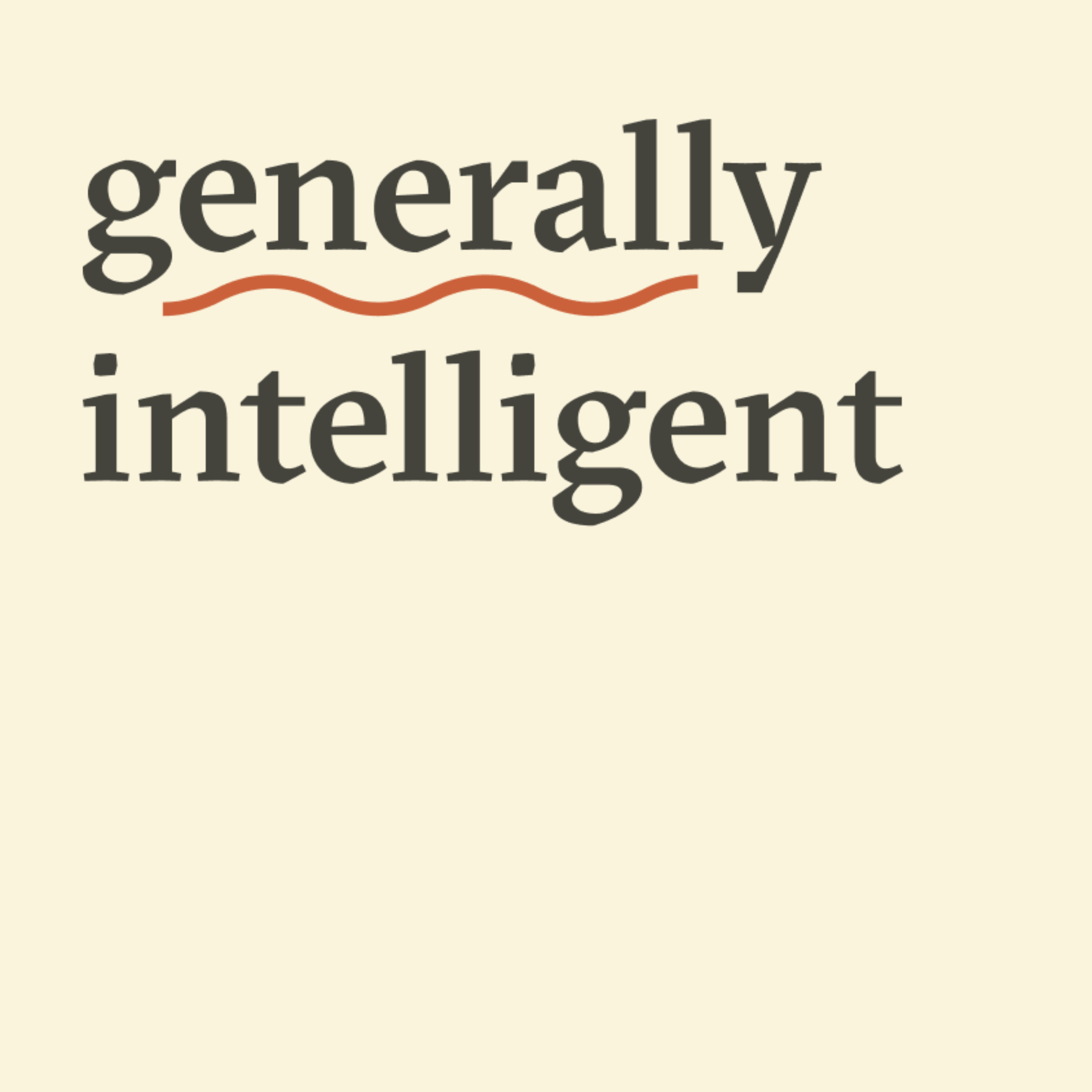

Generally Intelligent
Kanjun Qiu
Conversations with builders and thinkers on AI's technical and societal futures. Made by Imbue.
Episodes
Mentioned books

75 snips
Jul 19, 2022 • 1h 54min
Minqi Jiang, UCL: Environment and curriculum design for general RL agents
Minqi Jiang is a Ph.D. student at UCL and FAIR, advised by Tim Rocktäschel and Edward Grefenstette. Minqi is interested in how simulators can enable AI agents to learn useful behaviors that generalize to new settings. He is especially focused on problems at the intersection of generalization, human-AI coordination, and open-ended systems. In this episode, we chat about environment and curriculum design for reinforcement learning, model-based RL, emergent communication, open-endedness, and artificial life.

34 snips
Jul 11, 2022 • 2h 1min
Oleh Rybkin, UPenn: Exploration and planning with world models
Oleh Rybkin is a Ph.D. student at the University of Pennsylvania and a student researcher at Google. He is advised by Kostas Daniilidis and Sergey Levine. Oleh's research focus is on reinforcement learning, particularly unsupervised and model-based RL in the visual domain. In this episode, we discuss agents that explore and plan (and do yoga), how to learn world models from video, what's missing from current RL research, and much more!

Feb 28, 2022 • 1h 59min
Andrew Lampinen, DeepMind. Symbolic behavior, mental time travel, and insights from psychology
Andrew Lampinen is a Research Scientist at DeepMind. He previously completed his Ph.D. in cognitive psychology at Stanford. In this episode, we discuss generalization and transfer learning, how to think about language and symbols, what AI can learn from psychology (and vice versa), mental time travel, and the need for more human-like tasks. [Podcast errata: Susan Goldin-Meadow accidentally referred to as Susan Gelman @00:30:34]

Dec 21, 2021 • 1h 25min
Yilun Du, MIT: Energy-based models, implicit functions, and modularity
Yilun Du is a graduate student at MIT advised by Professors Leslie Kaelbling, Tomas Lozano-Perez, and Josh Tenenbaum. He's interested in building robots that can understand the world like humans and construct world representations that enable task planning over long horizons.

Oct 15, 2021 • 1h 26min
Martín Arjovsky, INRIA: Benchmarks for robustness and geometric information theory
Martín Arjovsky did his Ph.D. at NYU with Leon Bottou. Some of his well-known works include the Wasserstein GAN and a paradigm called Invariant Risk Minimization. In this episode, we discuss out-of-distribution generalization, geometric information theory, and the importance of good benchmarks.

Sep 24, 2021 • 1h 27min
Yash Sharma, MPI-IS: Generalizability, causality, and disentanglement
Yash Sharma is a Ph.D. student at the International Max Planck Research School for Intelligent Systems. He previously studied electrical engineering at Cooper Union and has spent time at Borealis AI and IBM Research. Yash’s early work was on adversarial examples and his current research interests span a variety of topics in representation disentanglement. In this episode, we discuss robustness to adversarial examples, causality vs. correlation in data, and how to make deep learning models generalize better.

6 snips
Sep 10, 2021 • 1h 21min
Jonathan Frankle, MIT: The lottery ticket hypothesis and the science of deep learning
Jonathan Frankle (Google Scholar) (Website) is finishing his PhD at MIT, advised by Michael Carbin. His main research interest is using experimental methods to understand the behavior of neural networks. His current work focuses on finding sparse, trainable neural networks.**Highlights from our conversation:** 🕸 "Why is sparsity everywhere? This isn't an accident."🤖 "If I gave you 500 GPUs, could you actually keep those GPUs busy?"📊 "In general, I think we have a crisis of science in ML."

Jun 18, 2021 • 60min
Jacob Steinhardt, UC Berkeley: Machine learning safety, alignment and measurement
Jacob Steinhardt (Google Scholar) (Website) is an assistant professor at UC Berkeley. His main research interest is in designing machine learning systems that are reliable and aligned with human values. Some of his specific research directions include robustness, rewards specification and reward hacking, as well as scalable alignment.Highlights:📜“Test accuracy is a very limited metric.”👨👩👧👦“You might not be able to get lots of feedback on human values.”📊“I’m interested in measuring the progress in AI capabilities.”

May 20, 2021 • 1h 10min
Vincent Sitzmann, MIT: Neural scene representations for computer vision and more general AI
Vincent Sitzmann, a postdoc at MIT, specializes in neural scene representations for computer vision. He discusses the crucial shift from 2D to 3D representations in AI, emphasizing how our understanding of vision should mirror the 3D nature of the world. Topics include the complexities of neural networks, the relationship between human perception and AI, and advancements in training techniques like self-supervised learning. Sitzmann also explores innovative applications of implicit representations and shares insights on effective research strategies for budding scientists.

May 12, 2021 • 1h 32min
Dylan Hadfield-Menell, UC Berkeley/MIT: The value alignment problem in AI
Dylan Hadfield-Menell (Google Scholar) (Website) recently finished his PhD at UC Berkeley and is starting as an assistant professor at MIT. He works on the problem of designing AI algorithms that pursue the intended goal of their users, designers, and society in general. This is known as the value alignment problem.Highlights from our conversation:👨👩👧👦 How to align AI to human values📉 Consequences of misaligned AI -> bias & misdirected optimization📱 Better AI recommender systems


